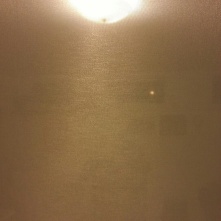Last week I purchased my materials to begin screen printing, $100 easily (but excitedly) spent. At The Art Store I purchased:
- a squeegee
- 4 jars acrylic ink (not for cloth) in green, black, red, and turquoise
- a screen with base (need to measure its dimensions | 124 mesh)
- a combination back of screen filler and drawing liquid
- 3 pieces of poster board (red, black, white)
- a bottle of screen cleaner
I brought the materials home to set up my (temporary: something to return to – the concept of a stationary workshop) workspace on the kitchen table. I had the idea to buy a really thick, lined plastic tablecloth to cover the table, but happened upon a spare shower curtain liner to use instead. Other materials I am considering acquiring: through by dad (an all around handyman) an incandescent worklight (or two), a collection of variously sized paintbrushes (I only have two), different types/sizes/colors of paper, fabric ink, found fabrics (on the cheap), something (unsure as to what yet) to dry prints on horizontally that doesn’t appear to be a place for two cats to nap, and some kind of lift to elevate the screen when working on the kitchen table surface (while standing), which stands at under 2.5 feet.
To write about my making process, I would like to make use of the fieldnote method of James Spradley (utilized in participant observation) described in Nicholas H. Wolfinger’s “On Writing Fieldnotes: Collection Strategies and Background Expectancies” which takes note of:
Space: the physical place or places
Actor: the people involved
Activity: a set of related acts people do
Object: the physical things that are present
Act: single actions that people do
Event: a set of related activities that people carry out
Time: the sequencing that takes place over time
Goal: the things people are trying to accomplish
Feeling: the emotions felt and expressed
Along with taking photographs and short video samples to make visible the process of production, products, problems, and byproducts.





